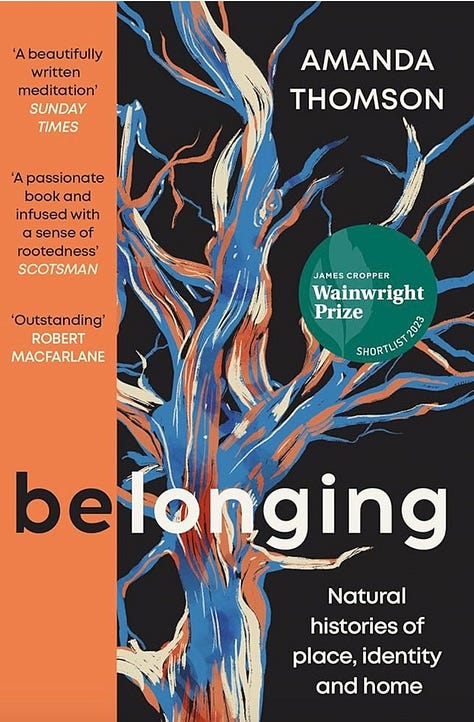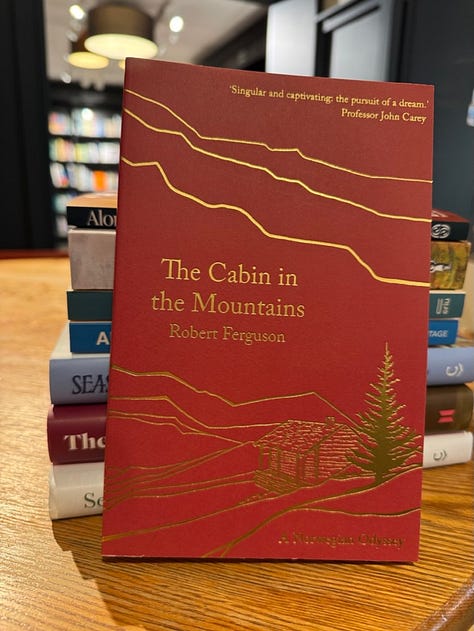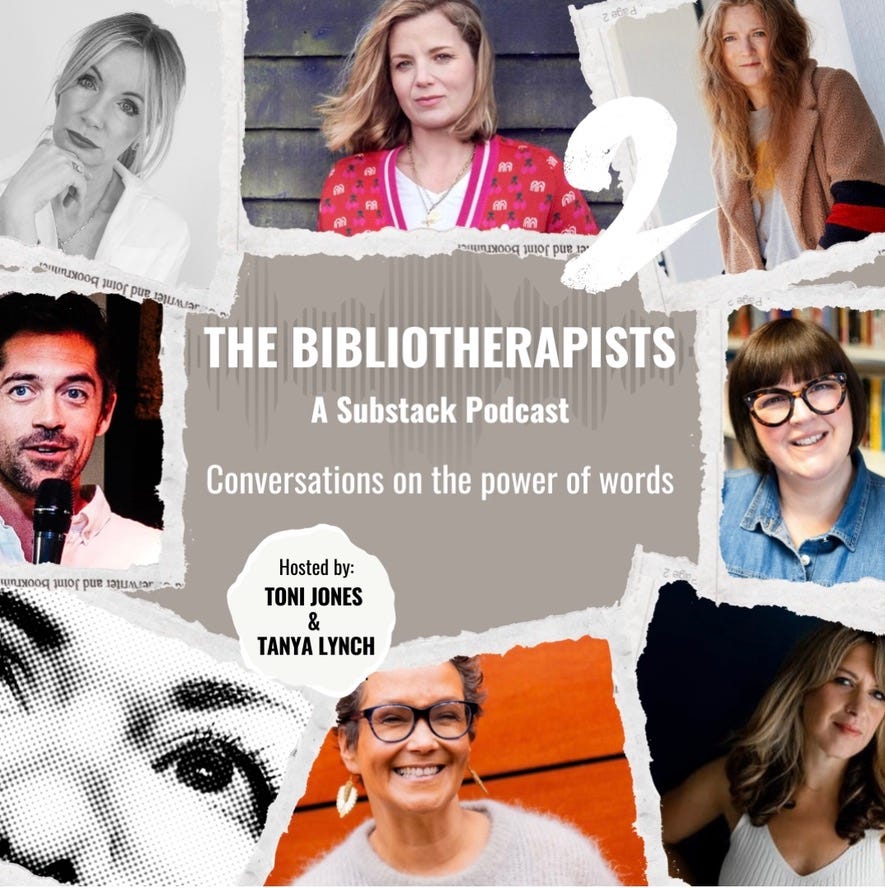





If you’ve just discovered my Substack or have been a regular free subscriber to my newsletter ‘with ease’ thanks for taking the time to connect. I dearly hope this essay resonates and if you find some value in my writing please consider becoming a paid subscriber. Thank you in advance, it really does mean the world to me.
Dear friend
How are you feeling today?
In light of what’s been headlining in the media and throughout my Substack feed this past week about The Salt Path, I wanted to share why I do, and always will love memoir.
You may or may not have read the article in The Observer on the 5th July, if you have, you’ll have made your own opinion about Raynor Winn, and how her so called true story is coming to light.
I don’t want to get into a tangle on here about what is, and what isn’t the true story behind The Salt Path saga. What I do want to do is celebrate memoirs, and shine a light on some of my favourite memoirists. After all, I’m in the process of writing my own memoir, and I need to keep the faith that this genre will live on for many decades to come.
If like me, you’ll find memoirs so utterly magical, that fiction simply can’t touch. When I sit down to open the cover of a new memoir, I’m not just reading, I’m being invited into someone’s most intimate truths, their messy, beautiful, complicated reality.
I’ve become completely obsessed with memoirs, and I want to shout from the rooftops about why these books deserve every bit of love and attention we can give them. They’re not just stories; they are acts of courage, windows into other lives and mirrors that help us understand our own experiences better.
What strikes me most about some of my favourite memoirists such as Helen Garner, Deborah Levy, Joan Anderson,
and is their extraordinary bravery. They take their most vulnerable moments, the heartache, the mistakes, the private struggles, and lay them bare on the page. They present me with a slice of their life that I’m fascinated by. They share their most raw experiences that makes me catch my breath and think, “Yes, someone else has felt this too.”Take Maggie Smith’s You Could Make This Place Beautiful as a brilliant example of a great memoir. I love the way she writes about her marriage falling apart, about rebuilding her life, about finding beauty in the wreckage, to me it’s devastating and beautiful all at once. And one I can wholeheartedly resonate with. Maggie doesn’t pretty it up or tie her story in a neat bow. She gives us the raw, uncomplicated truth of what it means to watch your life crumble and then slowly, carefully, piece together something new.
I’m especially fond of Deborah Levy with regards her descriptions of place, home and memory. Real Estate is one of three living memoirs in her trilogy, is a masterpiece that shows how memoir can be both deeply personal and universally resonant. The way she weaves together questions of home, belonging, and what it means to claim space in the world, it’s like watching an artist at work. Every sentence feels deliberate, every image burns bright in your memory.
Then there’s Joan Anderson’s A Year by the Sea, which for me personally has practically invented the whole genre of women running away to find themselves memoirs. But what makes it special isn’t just the story, it’s how Joan captures that feeling of being lost in your own life, of needing to step away from everything familiar to remember who you are underneath all the roles you play.
And then there is Cathy Renzenbrink, oh, where do I begin? Her ability to write about trauma and loss with such grace and humour is nothing short of miraculous. She shows us how telling our stories can be a form of healing, not just for the writer but for every reader who recognises themselves in those pages.
I feel that in the chaotic mess of social media posts, and filtered reality, memoirs feel like a rebellion against the pressure to present perfect lives. These books remind us that messy is normal, that struggle is universal, that our worst moments often contain the seeds of our greatest growth. The type of memoirs that I adore reading, they don’t just entertain, they validate. They whisper “You’re not alone in this Tanya.” They give me permission to be complicated, to make mistakes, to not have it all figured out. In the memoirs that I’m curious about, there’s no such thing as a perfect protagonist, and that’s exactly what makes them so powerful.
What I’ve come to love about great memoirists is how they understand that truth alone is not enough, you need craft too. The best memoir writers know how to make their specific story speak louder to broader human experiences. From working with some of the best memoirs, I’ve noticed how they understand pacing, the importance of scene-setting, and the art of dialogue. They know when to zoom in on a moment and when to pull back from perspective. They’re not just telling us what happened, they’re showing us what it meant, what it felt like, and why it mattered.
When I’ve collaborated and hosted writing retreats with some of our finest authors, including
, , and Cathy Renzenbrink, I’m reminded how these brave women have turned their lives into art. They all have an extraordinary talent of transforming their pain, frustration and sorrow into beauty, they remind us that every story is worth telling.So here’s to the magic of true stories, to the power of shared experience, to the beautiful messy, and to the complicated art of being human. I honestly believe that memoirs are the truths that weave us back together, one honest story at a time.
Here are some of my favourite memoirs…









If you’re in the process of writing your own memoir, but feel a little stuck, maybe you’re lacking confidence in your ability to write, these prompts and sentence stems might be just what you need. They’ve certainly helped me to silence my inner critic…
What made you fall in love with writing in the first place?
When did self doubt about your writing first creep in?
Write about why your specific voice, story or perspective matters. Who needs to hear what you’ve got to say?
Write about an author you admire and why and imagine what they must have flet like when they first started out.
Describe a time when you’ve been brave in other areas of you life. What gave you courage then? How did you push through fear? How can you apply the same courage to publish your writing?
Sentence Stems:
I enjoy writing memoir because…
My writing offers readers…
What makes my perspective unique is…
I have something important to say about…
If I don’d share this, the world will miss…
Do let me know if you enjoy reading memoirs, and please leave a comment with any memoir recommendations. I’m curious to find more memoirists, especially those that may be interested in hosting a memoir writing retreat.
Until the next time,
Take care and stay safe xx

The second series of The Bibliotherapsists podcast is out now. In which all of our guests, all of whom are writers on Substack, share their favourite books including some brilliant memoirs. You can tune in here and listen to our first conversation of the series with Clover Stroud.
If you’d like more information about the retreats and workshops I’m hosting this year and in 2026, or you’d like to join the waiting list, please don’t hesitate to email me at hello@easeretreats.com
Every Thursday at 1pm via Zoom - “Journal with Ease Club” with Tanya Lynch
25th July 2025 - “Drive Through Journalling by the Sea” with Tanya Lynch
19th August 2025 - “Rage on a Page” Online Journalling Series with Tanya Lynch
26th September 2025 - “Blueprint Your Season” Day Retreat with Tommy Ludgate
2nd - 5th October 2025 - “Rest + Read” Weekend Retreat with Lucy Pearson
17th - 20th October 2025 - “Digital Detox” Weekend Retreat with Tanya Lynch
April 2026 - "Substack with Ease" Day Retreat with Claire Venus
May 2026 - “Creative Unblocking” Weekend Retreat with Emma Gannon
12th June 2026 - “Finding Your Voice” Day Retreat with Laura Pashby
PS. Bring your unfinished stories.
Bring your wild dreams.
Bring yourself.
Because here ‘with ease’, you are always welcome.





So deeply touched and surprised to see my (pandemic-released!) only book here in your piece, Tanya. Thank you. I’m not online very often anymore and don’t anticipate publishing personal essays or memoir again, and so it’s lovely to feel you know about it.
I appreciate too how your post speaks to all that is best and most challenging in memoir: what it brings to readers, what it costs writers of it.
I’ve written more below - the first time in months I’ve felt moved to say anything on here about writing, so thank you! Feel free to ignore or delete, but adding it now in case it’s of interest to anyone reading through responses to your good piece, who hasn’t themselves been through the memoir publishing process.
Tanya x
Some books are fully written in first draft, or polished with an agent, before submission with lots of time to decide an approach. Mine was quite unusual for an unknown writer, in that it was acquired via pre-empt based on just a title and a few thousand sample words I wrote at the invitation of an agent who wanted to represent me. I went for a first meeting in the morning, and by the time I got home I had an offer which would expire the following day at 10am! I mention this because it meant I had to make my publisher choice quickly and then all my craft & ethical decisions while already under contract and time limits, with no experience of book publishing: it made me very conscious, I mean, of what I was doing. It wasn’t a private project I hoped would one day get a deal.
But whether the first draft to contract bit is quick or slow, post-acquisition it seems to me a process wherein all sorts of odd things can happen - even if one doesn’t plan to act in bad faith. Especially if one isn't clear going in on one’s ethical framework. That’s why books like Melissa Febos’s Body Work & Lily Dunn’s forthcoming one Into Being about the craft of memoir are such essential reading for first-time memoirists.
I was of course asked to write the most hard-hitting version of my story that I could. In the end I chose to write something more complex I think than had been imagined when I received my sudden time-limited offer.
In the three drafts I then went on to write through 2020 and 2021, I wasn’t pressured in any way to write a simpler story about life after sudden near-death. I was allowed to show how, despite all my other qualities, I had an aspect of my character that led me to do selfish and unwise things midway through my life as part of my response to almost-dying. But I can absolutely imagine how that could have gone very differently and led to a different kind of book, with or without editorial encouragement. It’s hard for a writer - once given a chance to publish - to forget the market, its tastes.
Another big test for memoir writers, when again things can get quickly out of hand, is publicity time. It’s so hard to get any press interest for most titles except the obvious big lead ones, that what’s a debut author to do when offered a last-minute or well-paid opportunity to write or talk about sensitive events beyond what’s been carefully crafted and checked for the book itself?
And nothing wrong with taking those opportunities of course! But if you’ve written a story with great care for persons still living who are in it, and then in interviews or features you take a more freeform approach (as is likely to happen in conversation) - what does that do to the book? Its long afterlife?
Maybe more sales but also more risk. In my instance, I chose not to do a feature on me and my mum together that would have reached a big target audience for the book pre-publication. I struggled with that decision then, and for a while afterwards while also knowing it was the right thing to do. I’d so carefully written about my mother using an altered name and don’t name the town; also didn’t reach out to my local paper to do a feature on it. But what if I’d then done a feature for the major paper she and all her family and friends read? Talking about her life after the last chapter of the book (as was asked for). Imagine how fast that would have led to situations beyond our control.
As it was the book has now found readers in my home town and current one in an organic way over the last five years: I’m fully known and accountable for it, but have had time to get used to being contacted and stopped in the street! Couldn’t have coped with it all at once back in 2022.
The above is a very different situation than fiction writers face post-publication, where they are asked about craft and inspiration and influences; memoir writers are too often asked for more... more backstory, more detail, more confession...
The other aspect of being even a modestly successful memoir writer is the amount of invites you get to teach workshops or even week-long residentials like Arvon. These are times of intense contact and trust when you are being given a chance to encourage and champion other writers in turn. People don’t only pay for our books, they often spend much more money travelling to and attending our events. And again, wanting a different kind of contact from writers of personal memoir than they do fiction writers or history/nature ones.
I’ve said a lot here I realise, when I don’t anymore. In short, the trust involved is huge, from start to finish. Which is why I’m still struggling with the allegations of the last week: books going wrong, I can kind of understand how that can get out of hand… but not so much direct engagement done in bad faith. So I hope it will turn out not to be the case, even as more and more details continue to come out.
I love a memoir for all the reasons that you state. Maybe if Raynor could have been as courageous and honest then we wouldn’t be where we are and The Salt Path would have been an even better book?!
Thank you for reminding me of Driving over Lemons I enjoyed that book a long time ago 🥰